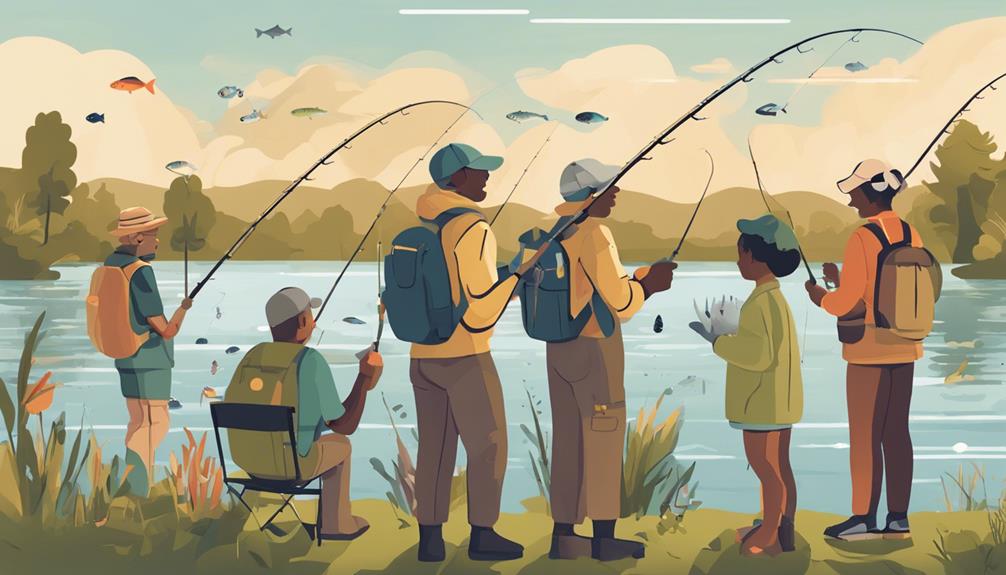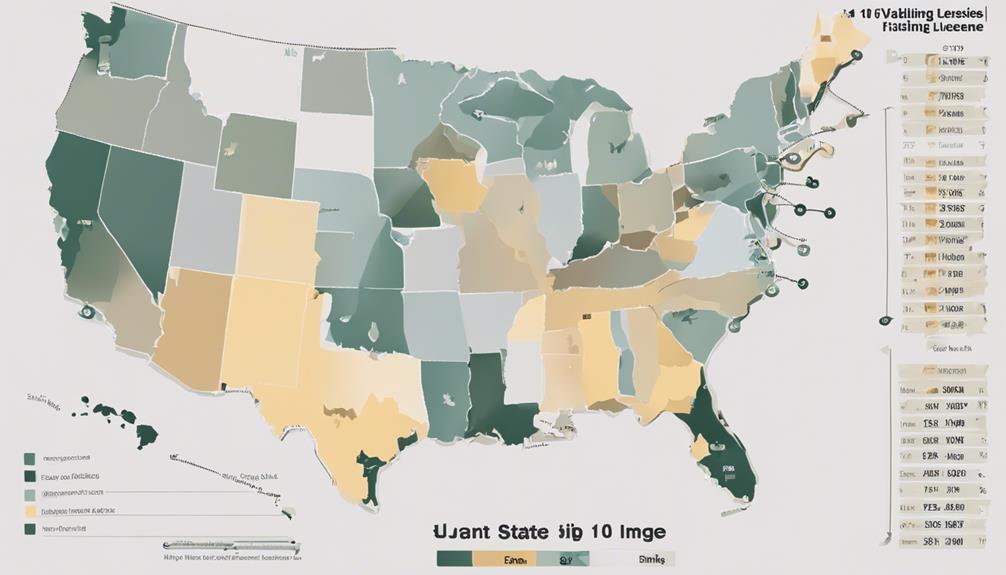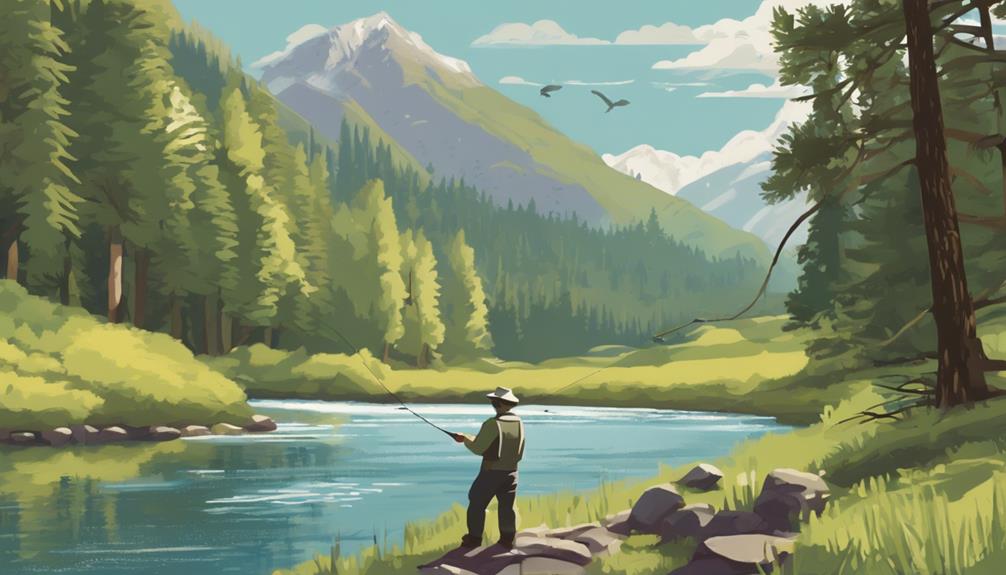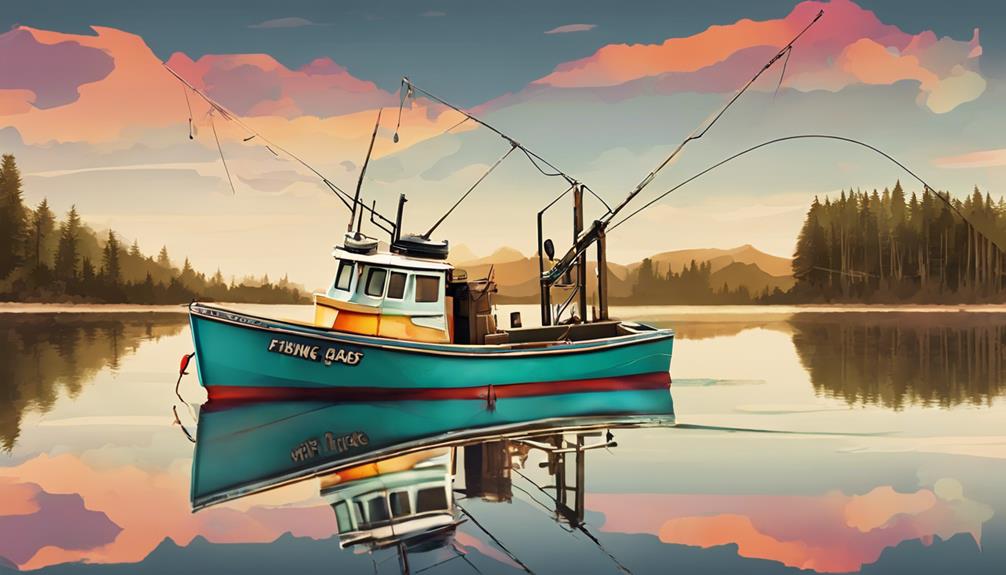When it comes to acquiring a fishing license, there are several nuanced considerations to keep in mind, especially concerning age restrictions. As you navigate the waters of regulations and eligibility, it's crucial to understand the various nuances that dictate who can cast their line.
From the minimum age requirements to exceptions for minors and the process of age verification, each aspect plays a vital role in ensuring compliance with the law. Stay tuned to unravel the intricate web of age limits for fishing licenses and how they might impact your angling pursuits.
Minimum Age Requirements
If you're considering obtaining a fishing license, remember that there's a minimum age requirement in place. This rule ensures that children are ready to handle the responsibilities that come with fishing. Child supervision and safety are paramount when it comes to fishing, and the minimum age requirement helps to guarantee that children have the necessary skills and understanding to fish responsibly.
When it comes to fishing, education is key. Teaching children proper fishing skills not only enhances their fishing experience but also promotes safety. By ensuring that young anglers have the knowledge and skills required to fish independently, the minimum age requirement contributes to overall fishing safety. It's important for children to learn about the different fishing techniques, equipment, and regulations to ensure that they can fish confidently and responsibly.
The minimum age requirement also helps to instill a sense of responsibility in young anglers. By demonstrating that there are age limits in place for obtaining a fishing license, children learn that certain activities require a certain level of maturity and understanding. This can help them develop important life skills such as patience, respect for nature, and adherence to rules and regulations.
Youth License Eligibility
To be eligible for a youth fishing license, young anglers must meet specific age requirements set by local regulations. Youth participation in fishing is encouraged through these junior angler licenses, which are tailored to introduce children and teenagers to the joys of fishing while also promoting conservation efforts. Junior anglers typically fall within the age range of 12 to 17 years old, but these age limits can vary depending on the state or country you're in. It's essential to check with your local fishing authorities to understand the exact age parameters for youth fishing licenses in your area.
These youth licenses often come at a reduced cost compared to adult permits, making it more accessible for young individuals to engage in fishing activities. By providing special licenses for junior anglers, authorities aim to foster a love for fishing from a young age and ensure the sustainability of fishing practices for future generations. Moreover, these licenses may come with certain restrictions, such as the need to be accompanied by an adult or to fish only in designated areas, ensuring the safety and well-being of young anglers.
Exceptions for Minors
Minors who meet specific criteria may qualify for exceptions to standard fishing license age limits. In many states, minors under a certain age aren't required to have a fishing license if they're accompanied by a licensed adult. This exception allows minors to enjoy fishing activities under the supervision of a licensed parent, legal guardian, or adult with permission from the minor's parent or guardian.
Parental supervision is a crucial aspect of these exceptions. Minors engaging in fishing activities without a license must be directly supervised by the licensed adult at all times. This rule ensures that the minor is learning proper fishing practices and safety measures while also adhering to fishing regulations. Legal guardians are also typically allowed to supervise minors without the need for the minor to obtain a separate fishing license.
Additionally, some states have specific regulations regarding the age at which minors can fish without a license. These regulations may vary, so it's essential to check the specific rules in your state. By providing exceptions for minors under certain circumstances, fishing regulations aim to promote family bonding, outdoor activities, and the passing down of fishing traditions from one generation to the next.
Adult License Regulations
Adults must obtain a valid fishing license to engage in fishing activities in most states. When it comes to adult license regulations, there are a few key points to keep in mind:
- Parental Supervision: While minors may require adult supervision when fishing, adults are generally free to fish independently without the need for supervision.
- Legal Responsibilities: Adults are fully responsible for understanding and adhering to all fishing regulations in their state, including size limits, catch limits, and restricted areas.
- License Renewal: Adults must ensure that their fishing license is renewed in a timely manner to avoid fishing unlawfully.
- Non-Transferable: Fishing licenses are typically non-transferable between individuals, and each adult must obtain their own license if they wish to fish.
- Enforcement: Adults should be aware that fishing regulations are enforced by authorities, and failure to comply can result in fines or other penalties.
Senior Citizen Discounts
When reaching a certain age milestone, you may be eligible for senior citizen discounts on fishing licenses in many states. These discounts are typically offered to individuals who've reached the age of 65 or older. To determine your discount eligibility, you'll need to provide proof of your age when purchasing a fishing license.
Age verification is a crucial step in the process of obtaining a senior citizen discount. States may require specific forms of identification, such as a driver's license or a state-issued ID card, to confirm your age. Some states may also accept alternative documents like a birth certificate or passport. It's important to check with your state's fishing license agency to understand their age verification requirements and ensure you have the necessary documents on hand.
Securing a senior citizen discount on your fishing license can provide significant cost savings for avid anglers who qualify based on their age. These discounts aim to make fishing more accessible and affordable for older individuals who may be on a fixed income. By taking advantage of these savings, you can enjoy your favorite pastime without breaking the bank. Remember to inquire about senior citizen discounts when purchasing your fishing license and be prepared to verify your age to avail of these cost-saving benefits.
Age Verification Process
To verify your age for a fishing license, present a valid form of identification such as a driver's license or state-issued ID card. Ensuring compliance with age restrictions is crucial in the verification process.
Here are some key points to keep in mind:
- Acceptable Forms of Identification: Make sure to carry your driver's license or state-issued ID card.
- Online Verification: Some states offer online verification processes where you can upload a scanned copy of your ID.
- In-Person Verification: If applying in person, present your ID to the licensing agent for verification.
- Age Restrictions: Be aware of the specific age restrictions for fishing licenses in your state.
- Renewal Process: The verification process may differ for renewing a fishing license, so be prepared to confirm your age again if needed.
Parental Consent Rules
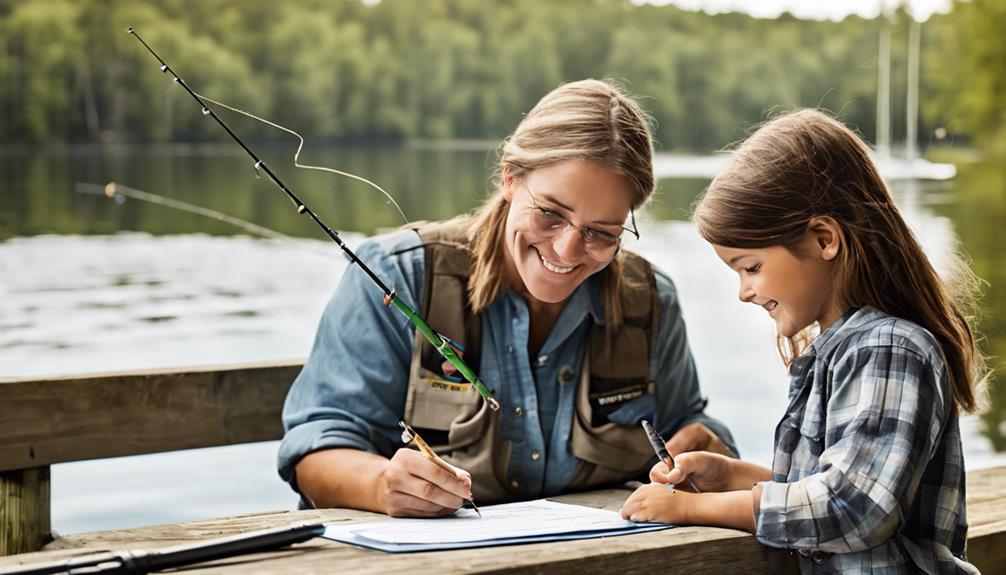
When applying for a fishing license as a minor, it's important to be aware of the parental consent rules in place for the application process. Parental consent is typically required for individuals under a certain age to obtain a fishing license. This rule ensures that parents or legal guardians are aware of their child's fishing activities and can provide guidance and supervision as needed.
Parental consent is crucial because it allows parents to assess their child's fishing experience and determine if they're ready to fish independently. Parents can evaluate factors such as the child's knowledge of fishing regulations, safety measures, and overall fishing skills. By providing consent, parents take responsibility for ensuring that their child follows fishing laws and practices ethical angling.
For minors with limited fishing experience, parental consent is especially important. Parents can use this opportunity to accompany their child on fishing trips, teach them the necessary skills, and gradually introduce them to the world of fishing. This guidance helps young anglers develop a passion for fishing while learning how to respect the environment and wildlife.
Age Limit Violations
If a minor fishes without meeting the age requirements specified for obtaining a fishing license, they're committing an age limit violation. It's crucial to understand the repercussions of such actions in order to abide by fishing regulations. Here are some key points to consider:
- Penalty consequences: Violating age limits for fishing licenses can lead to fines or other legal penalties. These consequences vary depending on the severity of the violation and the regulations in place.
- Enforcement measures: Authorities responsible for monitoring fishing activities may take strict enforcement measures against those who violate age limits. This could include confiscation of fishing equipment, suspension of fishing privileges, or legal action against the minor or their guardians.
- Education on regulations: It's essential for minors and their parents or guardians to be aware of the age limits specified for fishing licenses in their area. Education and awareness can help prevent unintentional violations.
- Community impact: Age limit violations can have broader implications for the fishing community, such as resource depletion or damage to the ecosystem. Respecting age restrictions helps maintain a sustainable fishing environment.
- Legal responsibility: Parents or guardians bear the legal responsibility for ensuring minors comply with fishing regulations, including age limits. It's important for adults to supervise and guide young anglers to prevent violations and promote responsible fishing practices.
Frequently Asked Questions
Are There Any Special Fishing Programs or Events Specifically Designed for Children and Teenagers to Help Them Learn About Fishing and Conservation?
There are fantastic youth programs and conservation events tailored just for kids and teens. These initiatives focus on education and outreach, teaching young people about fishing and the importance of preserving our environment.
They offer a fun and informative way for youngsters to learn new skills while developing a passion for conservation. Engaging in these activities can spark a lifelong love for fishing and nature in the younger generation.
Can Individuals With Disabilities Apply for a Fishing License at a Younger Age Than the Standard Minimum Age Requirement?
If you have a disability, you might qualify for exemptions from the standard minimum age requirement when applying for a fishing license.
Special accommodations could be available for individuals with disabilities, allowing them to start fishing at a younger age.
Contact the relevant authorities or organizations to inquire about these options and ensure you can enjoy fishing while receiving the necessary support tailored to your needs.
Are There Any Restrictions on the Types of Fishing Equipment Minors Are Allowed to Use When Fishing With a Youth License?
When fishing with a youth license, safety regulations dictate the types of fishing equipment minors can use. These rules ensure a safe fishing experience for young anglers.
Various fishing techniques can be employed with the approved gear, allowing minors to enjoy the sport while following guidelines. Remember to always prioritize safety and adhere to the regulations set forth for using fishing equipment with a youth license.
Are There Any Age Limits for Participating in Fishing Competitions or Tournaments, and Do They Vary by Location?
When it comes to participating in fishing competitions or tournaments, there are age limits to consider. These restrictions can vary depending on the location. Some tournaments may require parental supervision for minors, while others might've specific age eligibility restrictions in place.
It's essential to check the rules and regulations of each competition to ensure that you meet the age requirements before participating.
Are There Any Additional Benefits or Discounts Available for Senior Citizens Who Hold a Fishing License?
If you're a senior citizen holding a fishing license, there are often extra perks waiting for you. Senior discounts can come in handy, saving you some cash on your fishing adventures.
Additionally, some places offer fishing education tailored to seniors, providing valuable knowledge and skills to enhance your fishing experience.
Conclusion
Overall, age limits for fishing licenses are in place to ensure the safety and enjoyment of all anglers. From minimum age requirements to senior citizen discounts, there are regulations in place to accommodate everyone.
Remember to always follow the rules and regulations set forth by your state when it comes to fishing licenses, and enjoy your time out on the water responsibly.
Happy fishing!
